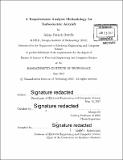A Requirements analysis methodology for turboelectric aircraft
Author(s)
Dowdle, Aidan Patrick
DownloadFull printable version (7.489Mb)
Other Contributors
Massachusetts Institute of Technology. Department of Electrical Engineering and Computer Science.
Advisor
Marija Ilić.
Terms of use
Metadata
Show full item recordAbstract
The aviation industry today requires novel aircraft technology to provide for its rapidly growing demand. Of the many aircraft technologies being proposed, turboelectric is of particular interest for commercial-sized aircraft. Turboelectric propulsion enables novel airframe configurations, boundary layer ingestion, and distributed propulsion, each of which can reduce the amount of power and energy wasted during aircraft travel. In addition, it could reduce the aircraft noise. However, the drawbacks of switching to turboelectric propulsion are the added mass of the electrical components and the increased complexity in designing the system. Much research to date has focused on exploring the trade-offs between electrical vs. non-electrical propulsion systems in terms of weight. However, experience from terrestrial power systems suggests that the addition of electrical components into the propulsion system could have major impact in terms of dynamics. For instance, the electronic components could be used to meet thrust requirements faster than traditional turboprop engines could. On the other hand, large power deviations could potentially destabilize the electrical components. This thesis develops an analysis methodology to determine the requirements for a turboelectric aircraft prior to detailed design of the subsystems.
Description
Thesis: S.M., Massachusetts Institute of Technology, Department of Electrical Engineering and Computer Science, 2017. Cataloged from PDF version of thesis. Includes bibliographical references (pages 81-82).
Date issued
2017Department
Massachusetts Institute of Technology. Department of Electrical Engineering and Computer SciencePublisher
Massachusetts Institute of Technology
Keywords
Electrical Engineering and Computer Science.